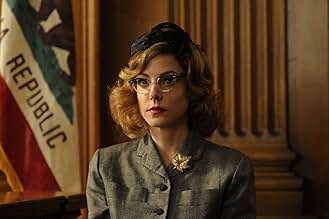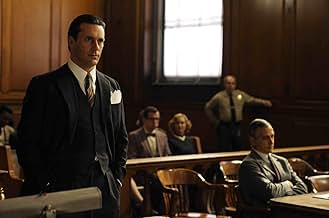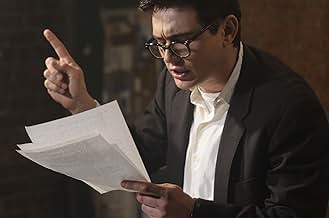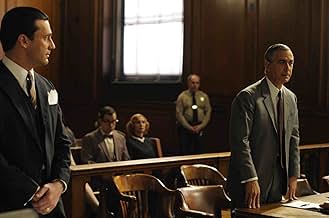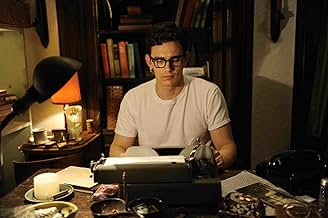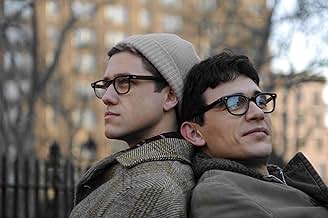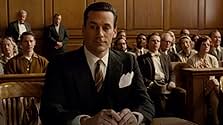CALIFICACIÓN DE IMDb
6.6/10
14 k
TU CALIFICACIÓN
Mientras Allen Ginsberg habla sobre su vida y arte, su poema más famoso está ilustrado en animación.Mientras Allen Ginsberg habla sobre su vida y arte, su poema más famoso está ilustrado en animación.Mientras Allen Ginsberg habla sobre su vida y arte, su poema más famoso está ilustrado en animación.
- Dirección
- Guionistas
- Elenco
- Premios
- 2 premios ganados y 8 nominaciones en total
Kaydence Frank
- Allen's Girlfriend
- (as Kadance Frank)
Allen Ginsberg
- Self
- (material de archivo)
- Dirección
- Guionistas
- Todo el elenco y el equipo
- Producción, taquilla y más en IMDbPro
Opiniones destacadas
Rob Epstein and Jeffrey Friedman's 'Howl' is an interesting and humorous depiction of the 1957 trial regarding Allen Ginsberg's controversial poem 'Howl'. In between the trial we are given glimpses of Ginsberg's life (in black and white) and an interview with him. The black and white sequences are beautifully shot. The style reminds one of French movies from the 50s. The recital of the poems takes some getting used to but once it is coupled with the animated sequence there's no turning back. It brings the poetry to life. Those are the highlights of the film. Moreover the animation is beautifully done. The pacing is uneven as its slow at times (especially in the beginning). I would have liked to have seen more glimpses of Ginsberg's life. The actors do a fairly decent job. James Franco does a good enough job and he is well supported by David Strathairn, Jon Hamm, Bob Balaban, Alessandro Nivola and Mary-Louise Parker. Overall, 'Howl' is an intriguing account and does quite well in introducing Ginsberg's poems to those who are not familiar with his works. The animation gives it a unique touch.
Howl might be a one-of-a-kind film experience if not for Chicago 10, another film that blended documentary, dramatization and animation together into a blender of personal history. But what sets this film apart from that and all others is that poetry becomes interwoven into a courtroom trial procedural - all, apparently, taken from the actual court transcripts of what the prosecution/defense asked of the people on the stand - so that it becomes about free speech. At the same time it's a quasi-biopic on Allen Ginsberg, who was a real free spirit, but also a shy Jewish kid from New York city who lost his mother as a child and worried about writing poems that might irk the ire of his father (he even considered not publishing Howl for that reason).
It's a beautifully surreal little treat of a film that treats its subject seriously while also giving life to the epic poem that stays timeless, as with Walt Whitman's Leaves of Grass (which also gets name- dropped here). The filmmakers bring together the poetic readings - done by James Franco, one of his real 'embodiment' performances like Saul in Pineapple Express that is basically stunning - from in front of a live audience (where one sees how Ginsberg at first has an audience patient and waiting and then is full of life and looking forward to every next thing he says) and in animation. The poem becomes alive through the low-budget drawings, and depending on the stanza it can be at least acceptable and at most mind-blowing. You almost want the poem to go longer to sink in deeper to those Ginsberg stanzas that flow out with what appears to be stream of consciousness, but really has a structure to it.
Acting is fantastic - David Straithairn, Jon Hamm and in a one-scene keeper Jeff Daniels - Franco keeps things moving so well with his performance, and the poem is given it's best context in personal and social history. All of a sudden, thanks to a film like this, the material becomes alive again, like a student picking it up and sinking into it for the first time.
It's a beautifully surreal little treat of a film that treats its subject seriously while also giving life to the epic poem that stays timeless, as with Walt Whitman's Leaves of Grass (which also gets name- dropped here). The filmmakers bring together the poetic readings - done by James Franco, one of his real 'embodiment' performances like Saul in Pineapple Express that is basically stunning - from in front of a live audience (where one sees how Ginsberg at first has an audience patient and waiting and then is full of life and looking forward to every next thing he says) and in animation. The poem becomes alive through the low-budget drawings, and depending on the stanza it can be at least acceptable and at most mind-blowing. You almost want the poem to go longer to sink in deeper to those Ginsberg stanzas that flow out with what appears to be stream of consciousness, but really has a structure to it.
Acting is fantastic - David Straithairn, Jon Hamm and in a one-scene keeper Jeff Daniels - Franco keeps things moving so well with his performance, and the poem is given it's best context in personal and social history. All of a sudden, thanks to a film like this, the material becomes alive again, like a student picking it up and sinking into it for the first time.
'Howl (2010)' is an offbeat experimental historical film about Allen Ginsberg's 1956 poem "Howl," the subject of a highly-publicised obscenity trial on its initial publication. James Franco plays Ginsberg, the reluctantly homosexual poet who poured his fears and frustrations into a four-part magnum opus, deemed a masterpiece and an obscenity in equal measure. I haven't read all that much poetry (though I have been known to recite Poe's "The Raven" in my most Vincent Price-ish voice), but I did like Ginsberg's poem, which is lyrical and evocative in a manner resembling the songwriting of Tom Waits. Several computer-animated sequences attempt to ascribe visuals to Ginsberg's words, but I wasn't sure about these: the CGI animation seemed too clean, too ordered, to represent such inner torment. Worth seeing, but perhaps not for everyone.
Watched in June 2010 I've never read Howl or really have had much interest in Allen Ginsberg, but having seen this delight of a film, things have changed.
The film takes a look at several key moments in Ginsbergs life. In B&W we see Ginsberg recite his poem Howl: there are also insights into his friendships with Jack Kerouac, Neal Cassady and his relationship with Peter Orlovsky. The reading of the poem is segmented throughout the film and in between these segments we see Ginsberg being interviewed, whilst we never see the interviewer, we do see Ginsberg talk about his life. The other main element is the trial of Howl, which was deemed obscene. All these aspects combine well and it never feels disjointed; they are nicely contrasted and offer great insights into the life of Ginsberg.
Add to this some wonderful animation that plays during much of the recital of Howl; it creates something of a reality to the poem and made it even more stunning and graphic and tragic and beautiful. The trial scenes are fascinating with the constant questioning by the prosecution as to what certain lines or words meant. And how wonderful the judge, who seemed to have made his decision well before the trial was over. Thank goodness for him.
James Franco plays Ginsberg and does so well, although he doesn't have too much to do, he is mostly either being interviewed or reciting; but it is in this he impresses, the passion, the intensity of the piece shines through: the ending of Howl, known as 'Footnote to Howl' is brilliantly spoken and I found it hugely emotional. The film has a slight doco feel to it at times, but it is otherwise an absorbing and wonderfully told account.
The film takes a look at several key moments in Ginsbergs life. In B&W we see Ginsberg recite his poem Howl: there are also insights into his friendships with Jack Kerouac, Neal Cassady and his relationship with Peter Orlovsky. The reading of the poem is segmented throughout the film and in between these segments we see Ginsberg being interviewed, whilst we never see the interviewer, we do see Ginsberg talk about his life. The other main element is the trial of Howl, which was deemed obscene. All these aspects combine well and it never feels disjointed; they are nicely contrasted and offer great insights into the life of Ginsberg.
Add to this some wonderful animation that plays during much of the recital of Howl; it creates something of a reality to the poem and made it even more stunning and graphic and tragic and beautiful. The trial scenes are fascinating with the constant questioning by the prosecution as to what certain lines or words meant. And how wonderful the judge, who seemed to have made his decision well before the trial was over. Thank goodness for him.
James Franco plays Ginsberg and does so well, although he doesn't have too much to do, he is mostly either being interviewed or reciting; but it is in this he impresses, the passion, the intensity of the piece shines through: the ending of Howl, known as 'Footnote to Howl' is brilliantly spoken and I found it hugely emotional. The film has a slight doco feel to it at times, but it is otherwise an absorbing and wonderfully told account.
I was lucky to watch this movie at the Athens Film Festival last Saturday and, despite its occasional flaws, I loved it. Ginsberg is fairly known to Greece , though most people (myself included) got to know him through his connection with Dylan. In that sense, I wasn't familiar with HOWL or the obscenity trial. For me , the movie's main attraction is the fact that it is not a biopic but a study on the creation of poetry, the power and magic of the words, the creator's struggle for genuineness through a dark path of madness and sexual frustration. The film is an unusual blend of poetry recitation, psychedelic animation, a graphic dramatization of Ginsberg's interview and a straight-forward dramatization of the trial.Some of them work fine and some not. Franco catches the right spirit of a young poet striving to find his way of expression and he is magnetic both in the recitation and in the interview scenes.The trial scenes , though well acted, seemed a little flat to me as compared to the vibrant tone that the poem itself imposes to the film . The animation was a bit uneven , in cases great (the Moloch section was terrific) , in cases indifferent and sometimes, for me, annoying. Apart from those parts that didn't work for me to the extend that I expected , the film is a unique docudrama, a magnificent and courageous ode to the power of words and the freedom of speech and a great depiction of the personal struggle of an artist to be truthful to himself.
¿Sabías que…?
- TriviaShot in 14 days around New York City in March/April 2009.
- ErroresAbout 29 minutes in, Franco (as Ginsberg) lights up a cigarette. You can clearly see a layer of digital shading (meant to darken Franco's beard) that is overlaid onto his face, esp. his left jaw. This shading also goes over Franco's hand in this scene.
- Citas
Allen Ginsberg: There's no beat generation. It's just a bunch of guys trying to get published.
- ConexionesFeatured in Late Show with David Letterman: James Franco/Sofia Vergara/Shakira (2010)
- Bandas sonorasTonight at the Sands
Written by Jack Arel and Jean-Claude Petit (as Jean-Caude Petit)
ZFC Music (ASCAP)
Courtesy of FirstCom Music
Selecciones populares
Inicia sesión para calificar y agrega a la lista de videos para obtener recomendaciones personalizadas
- How long is Howl?Con tecnología de Alexa
Detalles
- Fecha de lanzamiento
- País de origen
- Sitio oficial
- Idioma
- También se conoce como
- 嚎囂
- Locaciones de filmación
- Productoras
- Ver más créditos de la compañía en IMDbPro
Taquilla
- Total en EE. UU. y Canadá
- USD 617,334
- Fin de semana de estreno en EE. UU. y Canadá
- USD 51,185
- 26 sep 2010
- Total a nivel mundial
- USD 1,614,810
- Tiempo de ejecución
- 1h 24min(84 min)
- Color
- Mezcla de sonido
- Relación de aspecto
- 1.85 : 1
Contribuir a esta página
Sugiere una edición o agrega el contenido que falta







